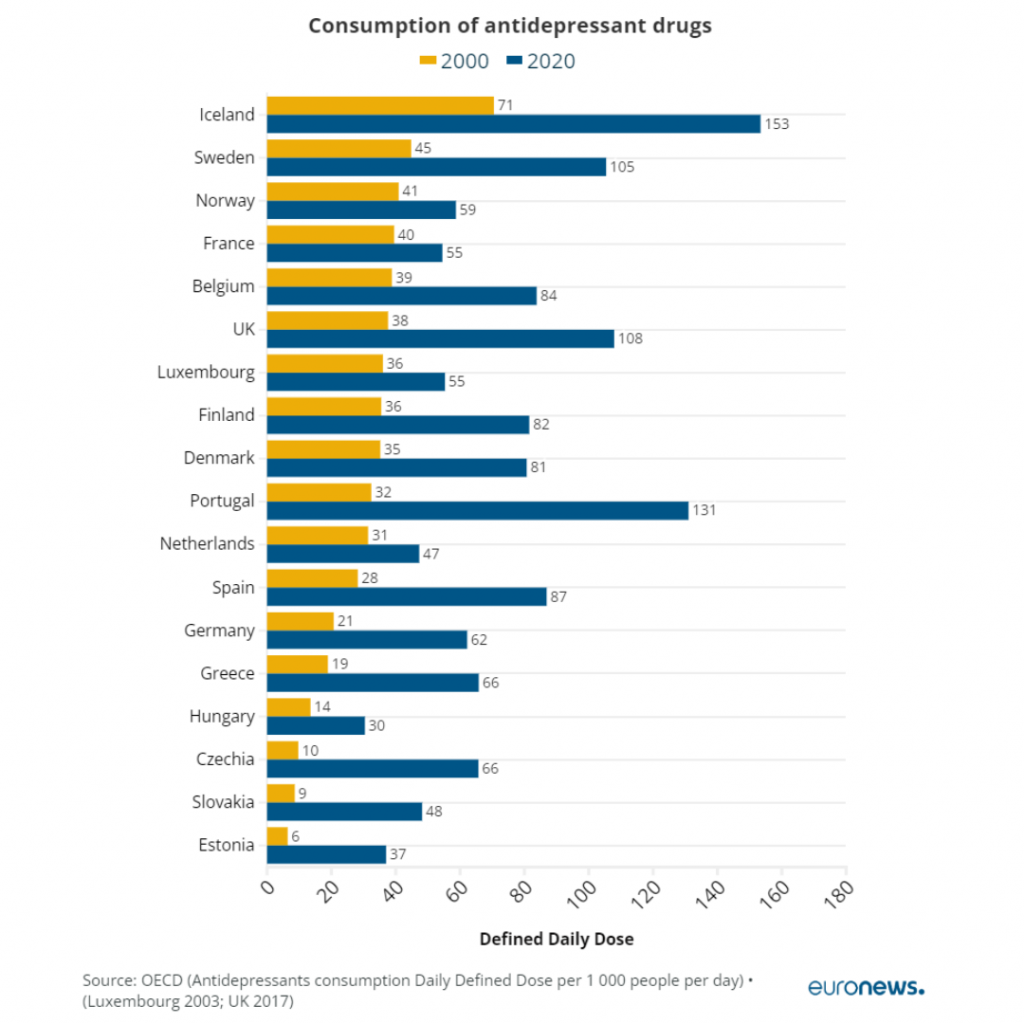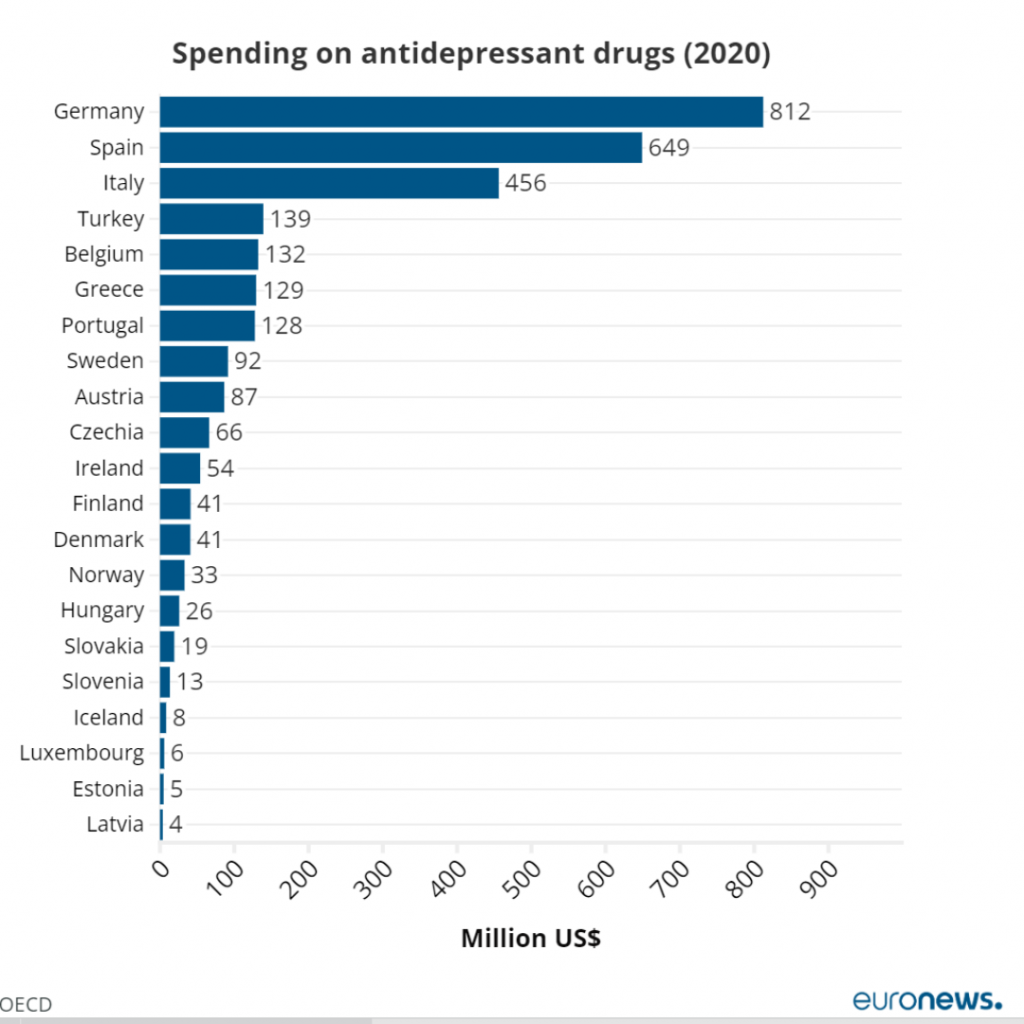The data processed by the Organization for Economic Cooperation and Development (OECD) speak for themselves: from 2000 to 2020 use of antidepressants more than doubled in at least 18 European countries. If twenty years ago on the continent they consumed an average of 30.5 pills a day for every thousand people, today we need 75.3, an increase of 147%.
Of course, looking at the long run, not all states have identical increases. If we take into account the starting point, i.e. the difference in pills taken between 2000 and 2020, the podium is won by the Czech Republicwhich in the same period recorded the highest increase, with +577%, going from 10 pills a day for every thousand inhabitants to 66.
A variation, however, much smaller, for example in France, where the dose has increased ‘only’ by 38% (from 40 to 55). Rather high peaks were also recorded in Portugal (+304%), Spain and Germany (+200%). Denmark is the only country to see a decrease in the use of antidepressants, but considering only the last 10 years (from 2010 onwards), with a decrease of 4%.
Focusing on 2020, however, surprisingly first place is occupied by Iceland, with 153 pills a day per thousand people, followed by Portugal (131), United Kingdom (108), Sweden (105) and Spain (87).

The latter, among other things, in the same year spent 649 million dollars for the purchase of pills (2.7% of the entire sale of drugs), surpassed by Germany with 812. In this ranking, Italy is place in third place, with 456 million dollars (1.7% of the total).

But why have the numbers soared over the years? Experts make one thing clear right away: the data shows that the correlation between happiness and antidepressant use is incorrect. So much so that although Sweden had the fourth highest intake of pills in Europe in 2020 (105), its position in the Happiness Report of the same year, – a ranking that evaluates citizen happiness, analyzing social, urban and natural conditions in which it lives – was among the highest in the world. Conversely Latvia, which had the lowest consumption of antidepressants at 20 daily doses in 2020, ranked 34th in the same happiness report.
The variation in pill taking, according to researchers who studied the influences on antidepressant prescribing trends in the UK between 1995 and 2011, would appear rather influenced by improved ability to diagnose and recognize depression. And again from the availability of therapies, the evolution of clinical guidelines, the change in the attitude of patients and health professionals (and their prejudice) and the expansion of the range of indications treated with antidepressants. Of course, it must also be taken into account, as evidenced by recent surveys published by the OECD, that mental health has significantly deteriorated also due to the onset of the COVID-19 pandemic.
On the other hand, narrowing the focus on Italy, the Italian Medicines Agency (AIFA) says that depression in our country is one of the conditions that has the greatest impact on health and quality of life (OSMED report on drug consumption in Italy in 2021 ). It is estimated that around 3 million people in our area are affected by depression (considering the various forms) and that around 6% of adults between 18 and 69 report depressive symptoms, more frequent with age, in gender women, in the most disadvantaged socio-economic situations and in people suffering from chronic pathologies.
The data says that in 2021 the consumption of antidepressants has accounted for 3.4% of total drug consumption and that the central regions have a level of use approximately 10% higher than in the north and approximately 30% higher than in the south, with wide regional and macro-area variability. In that year has around 7% of the Italian population used antidepressants, with an average duration of treatment of 8 months, even if a high percentage of subjects remain in treatment for less than 6 months and 12.2% receive only one prescription. AIFA hypothesizes that in some of the latter cases a non-pharmacological treatment could perhaps be indicated (the report highlights that only a small percentage of subjects receive appropriate treatment with antidepressants), especially in the light of recent discoveries.
According to research published in the academic journal Proceedings of the National Academy of Sciences, there is also antidepressant abuse among causes of antibiotic resistance. Excessive and unconsidered exposure to these molecules would strengthen the bacterial cells: the viruses inside would mutate rapidly to escape the action of the drugs. The World Health Organization (WHO) says that antimicrobial resistance, i.e. the decrease in the effectiveness of medicines for treating bacterial infections, is one of the greatest threats to global health, development and food security.
[di Gloria Ferrari]
